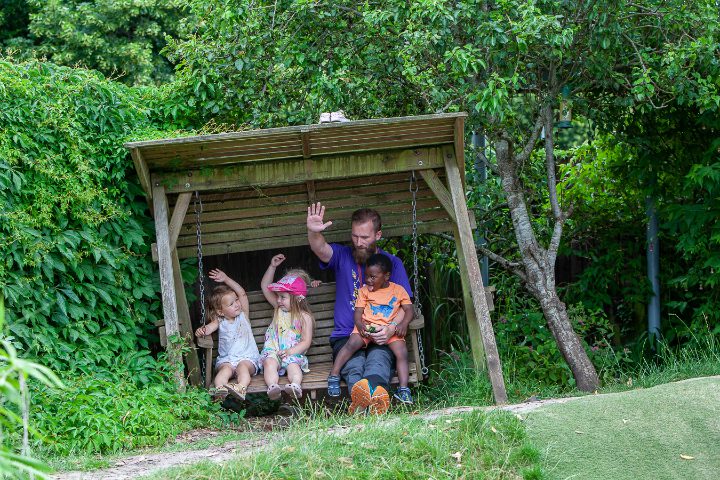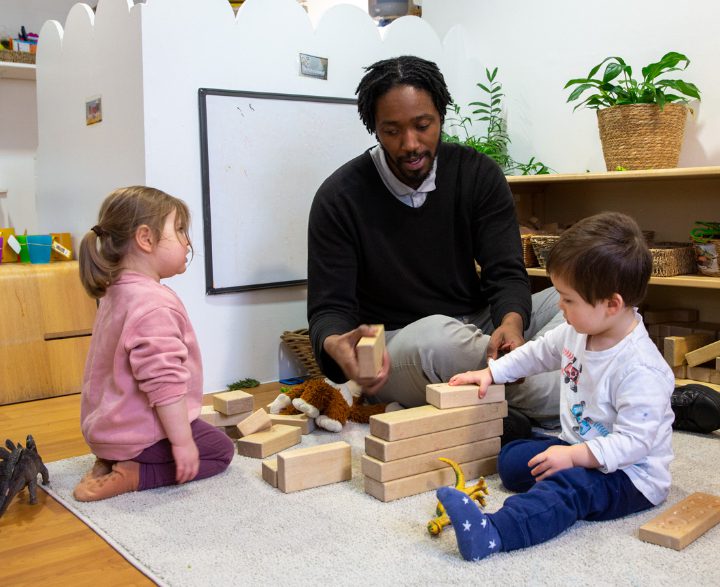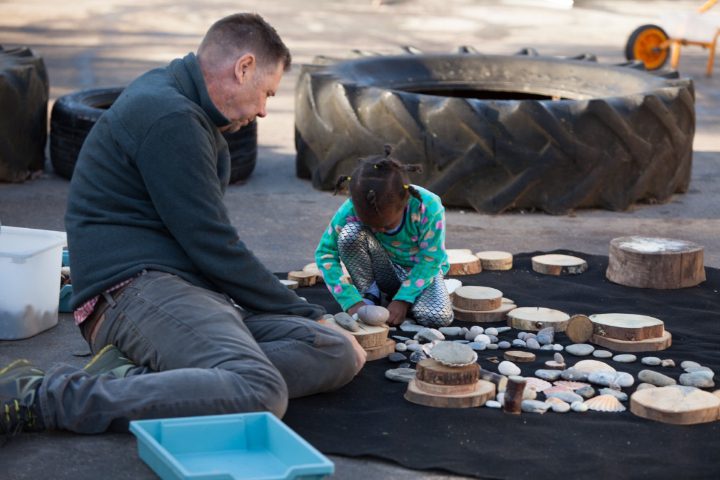An article by Pete Moorhouse asks what would Froebel have made of the current gender imbalance of educators working in early years settings and nursery schools?
Pete Moorhouse is a guest in our latest Froebel Trust podcast episode all about men working in the early years sector. Pete is a Froebel Trust Travelling Tutor and a renowned advocate for creativity in early education.
I am always taken aback by the lack of men – sometimes none - at large early years conferences; often just one or two solitary figures in a sea of women. The statistics vary but it is widely accepted that less than 2% of the early years workforce are male, and this figure is currently in decline.
In other occupations that were traditionally seen as roles for women, things have changed far more: 16% male nurses, 20% male social workers and 17% male care staff. The underrepresentation of men within the early years workforce is striking - the lowest percentage in 380 listed professions. It is clear that there is still a mountain to climb to change the gender imbalance in the early years.
At times in history we need to think differently. Friedrich Froebel was a visionary pioneer of early childhood education. He was a radical. He had a vision that education could be different in so many ways. When he developed his ideas around kindergarten in the mid-1800s, education was a male occupation, having its origins within the church. He saw that women could make a valuable contribution and founded the first teacher training college for women. This was ground breaking at the time. Nearly 200 years on the world looks very different again, culture has shifted and roles have changed. I’m convinced Froebel would now want to encourage a greater gender balance within early years settings.
What are the benefits of having men in early years settings and nursery schools?
Children benefit from having different genders in a setting and this can contribute to a more holistic nurturing environment. Men provide children with positive male role models and also provide opportunities for children to experience positive male – female relationships; seeing staff of different genders cooperate, laugh together and respect each other.
Many children may not have a significant male figure in their home lives, male early years educators can provide the experience of a positive male role model. It can allow children to experience building an emotionally supportive and safe relationship with an ’emotionally available’ male practitioner. Getting boys to acknowledge emotions and articulate them is so important and male educators can support this through modelling and listening. It can allow children who have had negative experiences with men to build positive relationships with men in a safe, caring environment.

Having men supporting and encouraging learning may also help develop boys' positive attitudes to learning.
The adults in nursery schools and early years settings are predominantly female - educators, mothers and carers. Fathers can feel uncomfortable in this environment and be reluctant to get involved in their child’s education. A male figure within the setting can support fathers in their involvement and understanding. It can also impact on how fathers feel about their role as care givers.
Children can benefit from the different experiences and caring styles men bring to the profession. Some men bring more active movement, and ‘rough and tumble’ play to the way they interact with their children. This can be a positive interaction when managed effectively. For some children more active learning is how they learn best. Providing these different perspectives, teaching styles and life experiences can enrich the learning environment.
Having men in the setting provides children with a more accurate reflection of the gender mix of their classroom, their community and the world around them. It becomes more normal. We don’t want children to just view nursery education as solely women’s work.
Male educators can challenge the stereotypes in relation to toys and activities. If we want our children to grow up in a world where there is equality of opportunity for all we need to challenge stereotypes – men can cook, play in the home corner, clean and of course, men can work with young children.

Check out Episode 8 of the Froebel Trust podcast
Hear from Pete Moorhouse and other guests in this special episode all about men working in early childhood education
Listen nowFriedrich Froebel was a visionary pioneer of early childhood education... I’m convinced Froebel would now want to encourage a greater gender balance within schools and early years settings...
What is stopping more men from working in early education?
There is a prevailing attitude that caring for the young is women’s work and it is 'unmanly'. These days, roles are becoming more fluid, often with both parents taking caring roles for their young children and more fathers staying home to look after young children while their partner works. But this trend is not evidenced in early years settings. I feel it misguided to think that men lack the skills to nurture young children. In reality there are more differences within a gender than between genders. There are many men that would make wonderful early years staff but never consider it a viable option. It’s hard to be what you don’t see.
Men may be discouraged by the prospect of working in a predominantly female environment – perhaps feeling out of place. It can feel awkward and isolating being the solitary male in a team, the only man in the staff room at lunch time. Could it also be that some are reluctant to employ men?
How do we feel about men as carers? Caring is often linked to 'maternal instinct'. Men can be apprehensive about providing nurturing or intimate care - such as cuddles or changing nappies - in a setting, and some parents are too. Many men across the country have talked about the increasing constraint they feel in having physical contact with children in their care. These are complex issues to reflect on and many men can find it easier just not to work in early years because of this. No one wants to feel judged or doubted.
Men and women often have similar traits. Gender differences can often be inaccurate generalisations, for example: ‘Men are more physical, like activities such as roughhousing– like to be active and goof about’. I know plenty of men that don’t. ‘Men don’t talk much’ – I know plenty of men that do. ‘Men lack empathy and a caring instinct’ – I know countless empathetic, caring men.
Senior leaders have an important role to help male staff combat stereotypical views or negative attitudes and build their confidence as valued educators. Leaders need to know how to sensitively manage conversations about male educators and there needs to be more advice and guidance both for men and setting leaders on how to navigate these issues.
Low wages are another factor for everyone in the sector. Successive government have undervalued early years educators. Wages clearly need to increase for all staff. But lots of us work in early years despite the low wages – because we know what a delight and joy it is to work with young children. We have to share this secret!

When I do talk with men who work in early years – their commitment is clear, they see it as a privilege to be a part of children’s learning and development and ensuring that the children in their care flourish and make the best possible progress. They make an important contribution.
The way forward
Firstly we have to see the current status quo as a problem that needs a solution.
As a sector I believe we need to make much more effort to encourage men to train to become nursery school and early years educators. We all need to have these conversations. Nurseries and schools need to be much more proactive. Settings can encourage men to apply for jobs. We can also explain to parents and carers why having men is beneficial, and reassuring those that have concerns. We have to acknowledge that there are extreme views out there, with some considering men that want to work with children as odd at the very least.
Male secondary school students should be offered work experience in nurseries. Careers advice should challenge stereotypes, and see early years education as a positive career choice.
The government needs to set targets to increase the recruitment of men and have a clear implementation strategy. There is an acute shortage of staff in early years. Could men be part of the solution?
Low wages do not help encourage men into the sector. Society needs to rethink the value of early years. The foundation stage is so critical for children’s development and it clearly needs vastly more investment. It is well documented that investment pays for itself with better outcomes in the long-term.
I am also an advocate of positive discrimination. The staff team should better represent the children. In order to attain this I feel recruitment should not be solely based on merit. If an ‘under-represented’ candidate is within a small margin of say 5% in interview scoring then it should be acceptable to offer them the position. I feel this is important. There is added ‘value’ in more diversity of staff to reflect that of the children who need role models they can relate to.
Currently there are very high drop out rates of men. We need to support male colleagues to remain in the profession. Senior Leaders can play an important role, by acknowledging some of the challenges men face and offering support. It can be beneficial for men to connect with other men working within early years (especially if isolated within a school), and paid time should be allocated to facilitating this. In Bristol we were lucky for many years to have a men’s support group (Bristol Men in Early Years). Men can join the national men’s advocacy group: MITEY (Men in the Early Years)
Importantly, as individuals, we can all play a part in changing culture and work towards providing a better gender balance for the children in our care. If we are committed to equal opportunities – for children and adults – we need to challenge stereotypes. We don’t want children to think only women can be care givers just as we don’t want girls to think they can’t be engineers. We need more men to believe that they can contribute to this wonderful sector, and that their contribution will be valued.
-
This edited article was first published in full on Irresistible Learning - Pete Moorhouse's website (with information about his early years creative consultancy).
About the author
Pete Moorhouse is an Early Years Creative Consultant and works regularly as an artist educator in settings. Froebelian principles very much inform his work with children. Pete is a Froebel Trust Travelling Tutor and an associate trainer for Early Education. He delivers CPD training and conference presentations throughout the UK and overseas.
Pete is the author of several books and journal articles including ‘Learning through Woodwork: Introducing Creative Woodwork in the Early Years’ (Routledge 2018), and ‘Outdoor Environments’ and 'Learning Outdoors' (Community Playthings 2019). You can download for free his Froebel Trust pamphlet (2021) The Wonder of Woodwork.
Pete is an Honorary Research Fellow at the University of Bristol, researching children's progression in their creative and critical thinking. He is a Churchill Fellow through which he researched woodwork in early childhood education around the world and in 2019 Pete was awarded the national award from the Creative Learning Guild for his work promoting creativity in education.
Pete is also a guest in Episode 8 of the Froebel Trust podcast (released in Jan 2024).


